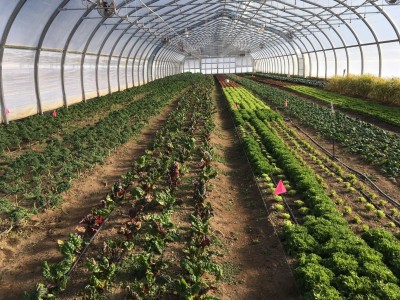Supplemental Heat for Winter Greens Production: What's the Cost?
Ethan Grundberg, Vegetable Specialist
Eastern New York Commercial Horticulture
 Winter greens in high tunnels at then Poughkeepsie Farm Project
Winter greens in high tunnels at then Poughkeepsie Farm ProjectThere seems to be little agreement among winter greens growers regarding the true costs and potential value of using supplemental heat all winter. With support from the Northeast Sustainable Agriculture Research and Education program (NE SARE) and the generous cooperation of the Poughkeepsie Farm Project (PFP), we tried to start gathering some data to add to the high tunnel heating debate. We tracked yield, soil nitrate availability, total nitrogen uptake, propane use, and soil temperature all winter in the two identical side-by-side 42'x196' double layer inflated poly Harnois high tunnels with one tunnel set to 33 degrees ambient air temperature and the other set to 40.
The data from the trial is still being analyzed, but here are a few key results that have emerged:
- Maintaining adequate soil moisture and, ideally, living roots in the high tunnel before planting is necessary to preserve the soil microbial community that makes nitrogen available for plant uptake.
- Soil nitrate levels were not significantly or consistently different between the two temperatures; however, total nitrogen uptake in the warmer tunnel was higher for curly kale, spinach, and especially for Salanova lettuce.
- The warmer tunnel yielded three harvests in the same time that the cooler tunnel yielded only two.
- It took 979 gallons of propane to heat the tunnel to 33 degrees from November through March. It took 2.1 times as much propane to add the extra 7 degrees to reach 40 over the same period.
- Fertilizing to 70 pounds/acre of nitrogen in September provided sufficient nitrogen to kale, spinach, and Salanova until mid-February.
- Targeted early spring fertigations with soluble Chilean nitrate carried those crops to maturity in early April
A big thanks to the great crew at PFP for all of the help tracking yield! Going forward, a group of vegetable specialists with Cornell Cooperative Extension hopes to continue to investigate fertility management in winter high tunnels generally and specifically the interplay between supplemental heating and nitrogen. If you are interested in collaborating, please reach out to Ethan at eg572@cornell.edu.
This article is from the April 26, 2018 edition of ENYCHP Vegetable News. To read the full newsletter, CLICK HERE.

Upcoming Events
2026 Northeast Extension Fruit Consortium Winter Webinar Series
February 4, 2026 : Management of Up and Coming Strawberry Diseases in the Northeastern United States
Session 1: Management of Up and Coming Strawberry Diseases in the Northeastern United States
February 11, 2026 : Kiwiberry Production in the Northeast
Session 2: Kiwiberry Production in the Northeast
February 18, 2026 : Heat Mitigation- Sunburn and Fruit Coloring
Session 3: Heat Mitigation- Sunburn and Fruit Coloring
February 25, 2026 : The Dating Game- Updates in Lepidopteran Mating Disruption
Session 4: The Dating Game- Updates in Lepidopteran Mating Disruption
March 4, 2026 : USEPA Endangered Species Act Strategies and Pesticide Use
Session 5: USEPA Endangered Species Act Strategies and Pesticide Use
March 11, 2026 : Practical Drought Management for Fruit Growers
Session 6: Practical Drought Management for Fruit Growers
Managing the Invasive Swede Midge Webinar
March 6, 2026 : Managing the Invasive Swede Midge Webinar
Swede midge is an invasive fly that causes serious economic losses to brassica crops. Due to its small size and hidden feeding habits, swede midge is often called an "invisible pest" and damage may be misdiagnosed. In this webinar, we will review the swede midge life cycle and crop damage symptoms, current management recommendations, new research findings, and highlights from on-farm case studies with a focus on organic management.
New Farm Manager Skills Day - Get the Tools You Need to Grow Your People (Hudson Valley)
March 10, 2026 : New Farm Manager Skills Day - Get the Tools You Need to Grow Your People
Millbrook, NY
Are you moving into a supervisory farm management role this season and want to get off to a good start? Are you an experienced manager who wants to connect with other "people" managers and work on your skills? This one-day workshop is for you!












































